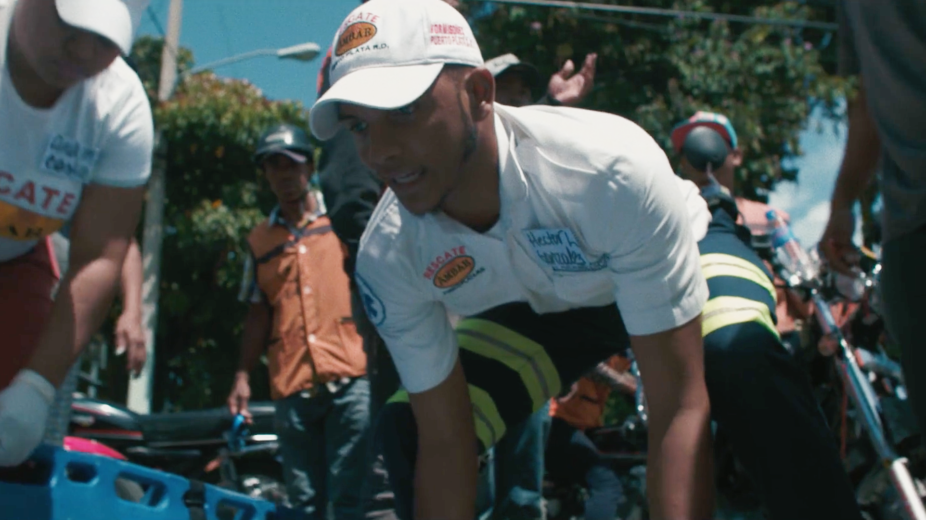Rescate is a documentary short by Canadian filmmaker Mark Bone. It tells the fascinating story of Rescate Ambar, who are a group of volunteer emergency responders in Puerto Plata, Dominican Republic who try, with minimal training and very little in the way of resources – to save lives, specializing in transporting people who have had automobile and motorcycle accidents, in a country with the most transit related deaths in the entire world.
The focal point of the documentary is Reynaldo Ortiz Santos, a tow truck operator by day, and head of the Rescate volunteer emergency response team that operates 24 hours a day. During the film we see them at work, rescuing young motorcycle daredevils who push their luck too far, assisting pedestrians hit by cars and unfortunately, transporting bodies.
The documentary is a fantastic piece of art, with shots showing us parts of the resort town of Puerto Plata that tourists rarely see, yet do so in a dignified way, while simultaneously addressing the issues of poverty and lack of infrastructure without the “ghetto voyeurism” feel that often times demeans its subjects. One gets a sense during the film, that this story could be set in any rural town in the Dominican Republic, the Caribbean or Latin America.
“I wanted to create a film that shows the resilience of the Dominican people, and celebrate their efforts despite the problems they face,” said Mark Bones, director of the documentary. “I spent five years and over a dozen trips there and built friendships with the people. They don’t want the country to be the way it is, and you realize that the problems are a result of government and economic policy, not on the people. I didn’t want to tell a story that shamed them because I know if I would have been born there, I would have had the same experiences.”

In the film, one can’t help but relate to Santos’ testimonial about the death of a family member after an accident, mostly due to the inability to pay for emergency care. There are those who would argue that the United States is starting to resemble developing countries in Latin America as policy is geared more and more to the benefit of affluent over its most needy citizens because they lack the resources to influence decision makers. And with that shift, comes an increasing amount of similar stories, this time on our shores.
As such, the film is also plays like a subtle warning to those of us in the United States who don’t quite understand the effects of starving a government of resources to help its citizens. Jeopardizing the ability to experience things we take for granted in our country – like safe streets and access to emergency care.
“This is what happens when an economy is set up to serve the upper echelons of society,” said Bones. “The Dominican Republic gets over five billion in revenue from the tourism industry, but can’t provide healthcare, emergency services, or even street lights to its people. It affects the psyche of a nation when basic human needs and public services are not met.”
The film made its debut online December 5th and has resulted in an outpouring of support for the Rescate team. Firefighters Without Borders recently visited Puerto Plata and brought with it supplies and assisted in training the team on vehicle extrication techniques. Moreover, a donation link was established on the website and has allowed people from around the world to donate to their cause. The Dominican Republic has also started to roll out a 911 emergency system in the capital of Santo Domingo, and is in nascent stages of the program in Puerto Plata.
The documentary’s message shows us that the human condition is indeed resilient, and that there will always be those, regardless of education or economic status, that will step up to help a community despite the high cost. It forces us, even thousands of miles away, to try to answer the question Mr. Santos asks: “What have you done during your time on Earth?”
